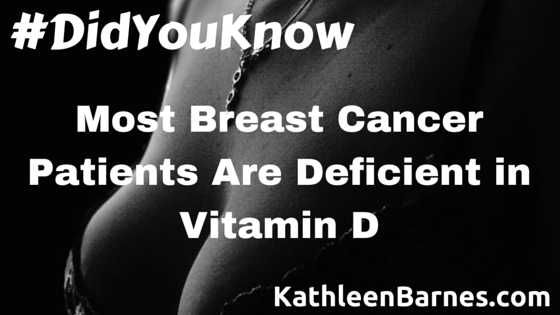If you’re on the fence about taking vitamin D supplements here’s another nudge to get you off that fence and taking a high quality vitamin D supplement every day.
Groundbreaking Indian research shows that more than 95% of breast cancer patients studied are vitamin D deficient.
The study, published in the May 2012 issue of the Indian Journal of Endocrinology and Metabolism, concluded that “almost all patients with breast cancer were vitamin D deficient.”
Researchers studied 90 perimenopausal and menopausal women with breast cancer and a control group of 90 women without cancer.
The National Institutes of Health recommends blood concentrations of Vitamin D at 36-40 ng/mL and it’s important to note that the women with breast cancer had a mean blood level of 9.3 ng/mL and the healthy women had mean blood levels of 14.9, both far below optimal levels.
The easiest and cheapest way to help your body manufacture vitamin D is to expose as much skin as possible to sunlight for about 15 minutes 2 or 3 times a week.
Our national obsession with sunscreen has worked to our detriment when it comes to vitamin D. Vitamin D Researcher Michael Holick Ph.D., of Boston University estimates that 95% of Americans are vitamin D deficient in winter, somewhat less in summer, but sunscreen prevents the body from using those vital sun’s rays to manufacture usable vitamin D.
While it is still important to protect your skin from harmful UV rays, brief exposures won’t cause sunburn, even in the most fair-skinned people, and can enable your body to manufacture as much as 20,000 IU of vitamin D in one sitting.
As a precaution, at least in winter, you can safely take up to 5,000 IU of vitamin D 3, cholecalciferol, the most absorbable form of vitamin D, every day.
Better yet, have a simple blood test that measures your vitamin D levels so you know for sure.
The Indian study doesn’t imply that vitamin D deficiency causes breast cancer, but it does suggest there is some connection between Vitamin D levels and breast cancer.
This new research on breast cancer is added to a growing body of research that shows vitamin D prevents and treats a dozen types of cancer as well as preventing and treatment all types of musculoskeletal complaints, heart disease, depression and dementia, obesity and much more.
Look for my upcoming book on the far-reaching effects of proper vitamin D levels. I hope to have it out in the fall.







